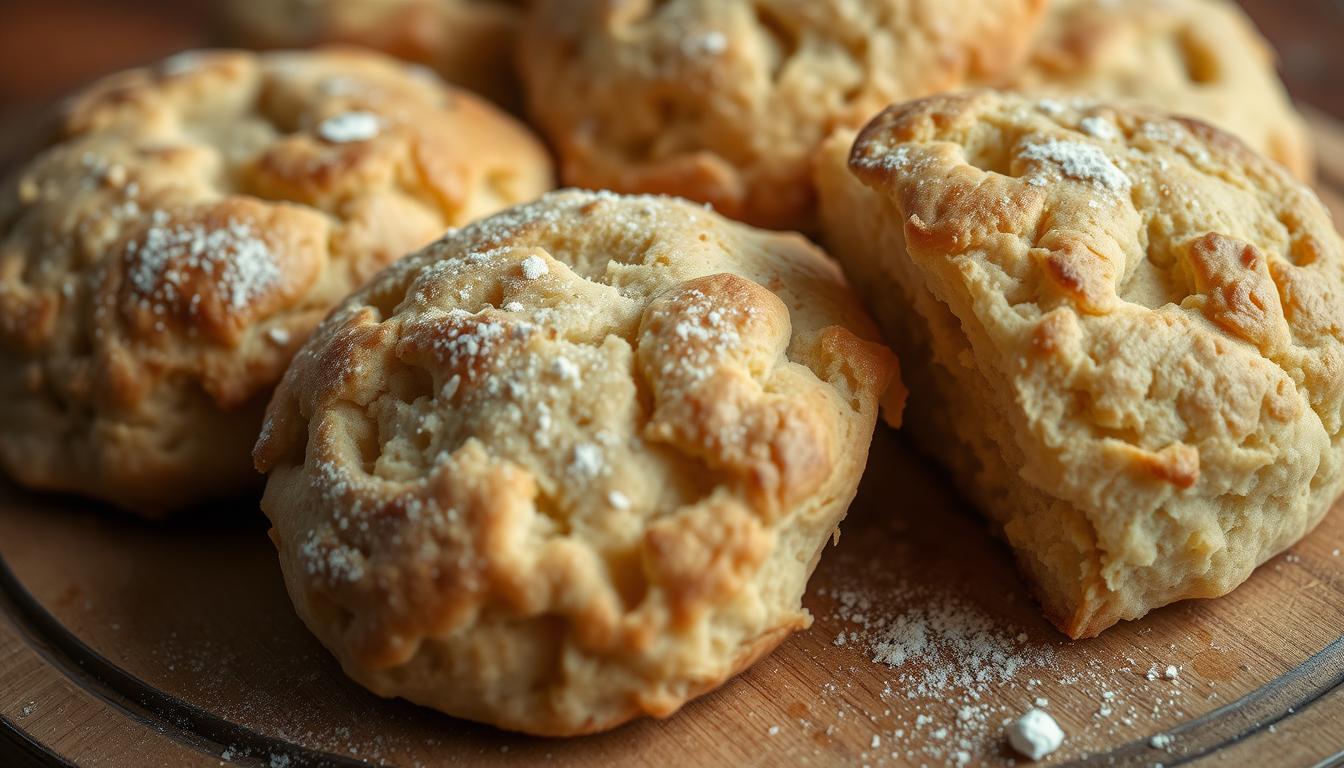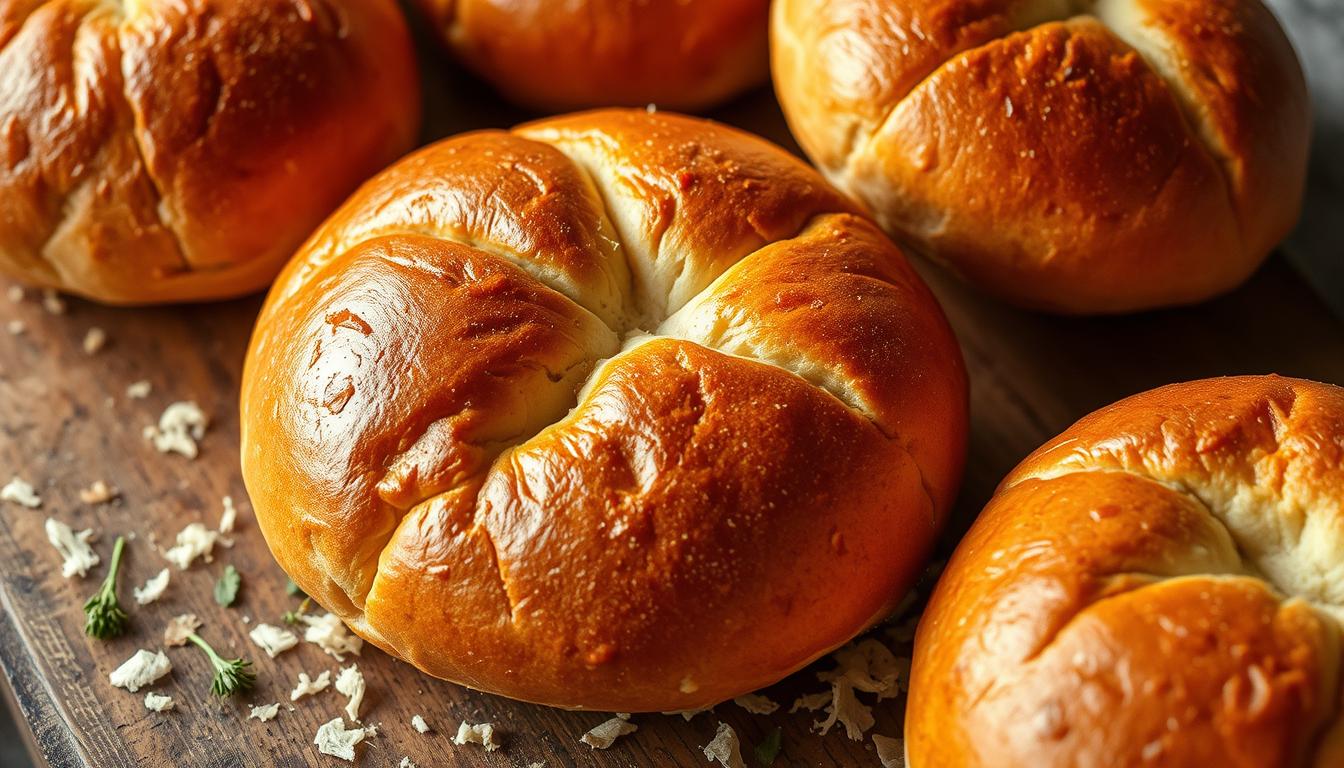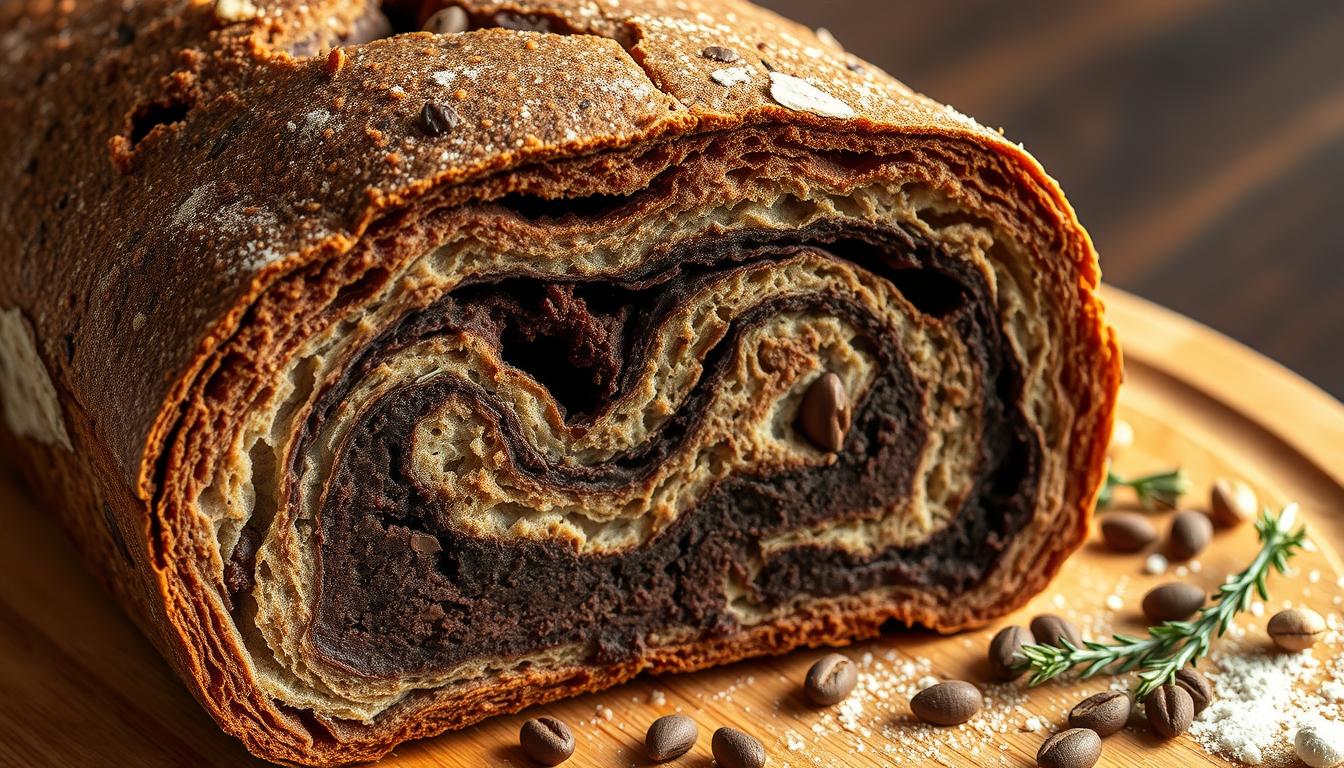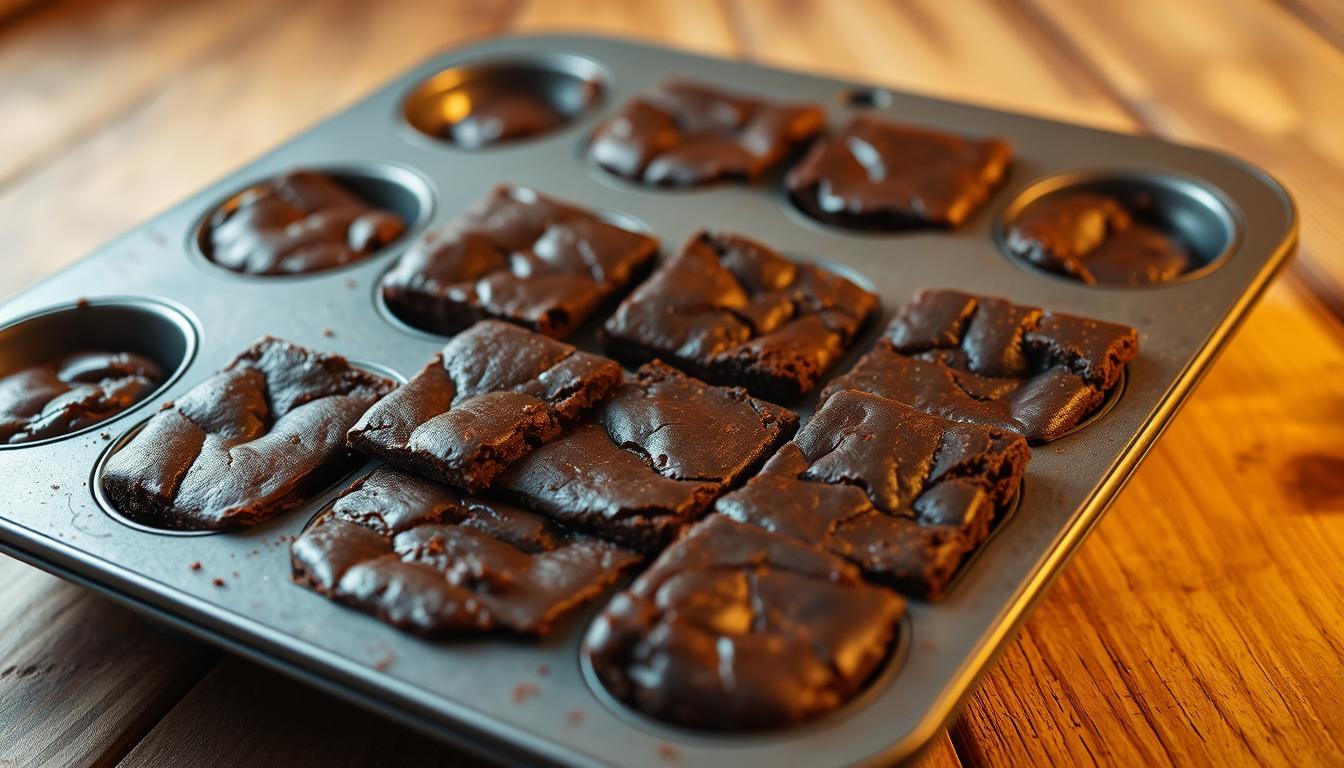The smell of sourdough scones baking in my kitchen feels like coming home. It’s like magic happens when simple ingredients turn into a tasty treat. This treat connects us to old baking traditions.
Wondering how to make perfect homemade sourdough scones? You’re in for a tasty journey. Scones are more than just a pastry. They’re a mix of flavors, textures, and creativity in the kitchen.
These treats are not only tasty but also a great way to use sourdough discard. You can make them sweet or savory. This means you can try many different flavors and recipes.
Key Takeaways
- Sourdough scones are an easy and delicious way to use sourdough starter
- The recipe is beginner-friendly and requires minimal specialized equipment
- You can create both sweet and savory variations
- Total preparation time is just 30 minutes
- Perfect for breakfast, brunch, or an afternoon snack
- Freezer-friendly for make-ahead convenience
What Are Sourdough Scones?
Sourdough scones are a special twist on traditional baked goods. They turn simple pastries into something truly special. The magic of fermentation makes them tangy and tender, unlike regular scones.
Sourdough scones use sourdough starter discard, which adds a unique flavor and texture. This fermentation process gives them a deeper taste, making them a favorite for breakfast and brunch.
Understanding Sourdough Scones
Sourdough scones offer endless possibilities for both sweet and savory treats. The basic recipe includes:
- 220 grams of sourdough starter discard
- 257 grams of all-purpose flour
- 67 grams of granulated sugar
- Potential mix-ins like fruits or chocolate
Exploring Sourdough Scones Flavors
There are many flavors to try with sourdough scones. Here are some ideas:
- Sweet Variations: Blueberry, chocolate chip, cranberry
- Savory Options: Cheese and herb, bacon and chive
- Seasonal Specials: Pumpkin spice, lemon lavender
You can add up to 1 cup of mix-ins to make your scones just right. This makes sourdough scones a great way to get creative in the kitchen.
Essential Ingredients for Sourdough Scones
Making homemade sourdough scones is all about the right ingredients. These ingredients are key to getting the perfect texture and taste. Choosing high-quality components is crucial for success.
Flour: The Foundation of Sourdough Scones
Choosing the right flour is essential for sourdough scones. You have several great options:
- All-purpose flour (300 grams)
- Whole wheat flour for added nutrition
- Combination of different flour types for complex flavor
The Magical Sourdough Starter
Your sourdough starter is the heart of these scones. With ½ cup (100 grams) of sourdough discard, you get a tangy flavor and better digestibility. The starter breaks down gluten, making the scones easier to digest.
Adding Flavor with Mix-Ins
Make your homemade sourdough scones even better with creative mix-ins:
- Fresh blueberries (1½ cups)
- Preserved lemon (1 tablespoon, minced)
- Chocolate chips
- Dried fruits
- Nuts and seeds
Here are more essential ingredients for baking sourdough scones:
| Ingredient | Amount | Percentage |
|---|---|---|
| Cold Butter | 1 stick (4 ounces) | 28% |
| Sugar | ½ cup | 29% |
| Heavy Cream | ½ cup | 45% |
| Salt | ½ teaspoon | 1.2% |
Pro tip: Keep all ingredients cold for the flakiest texture. The right mix of ingredients turns simple ingredients into a remarkable treat.
Tools You’ll Need for Baking
To bake great sourdough scones, you need the right tools. Having the right equipment in your kitchen is key. It helps you make delicious, perfectly textured treats every time.
Baking Equipment Essentials
Start your sourdough scones journey by choosing the right tools. Here are the must-haves:
- Digital Kitchen Scale: Precision is key in sourdough scones. A digital scale helps you measure ingredients accurately.
- Baking Sheet: Pick a heavy-duty sheet for even heat.
- Parchment Paper: It prevents sticking and gives a golden-brown crust.
- Bench Scraper: Great for cutting and shaping scone dough.
Recommended Utensils for Preparation
Special tools can make your sourdough scones baking better:
- Dough Whisk: Perfect for mixing starter and dough without overworking.
- Large Mixing Bowl: Choose one with clear measurement markings.
- Sharp Knife or Pastry Cutter: For precise scone shaping.
“The right tools transform baking from a task to an art.” – Professional Baker’s Wisdom
Investing in quality baking tools will help you make consistently delightful sourdough scones. They will impress everyone every time.
Step-by-Step Guide to Making Sourdough Scones
Making the best sourdough scones recipe needs care and precision. This guide will help you make delicious sourdough scones. They will impress your family and friends.
Preparing the Dough
First, gather your ingredients for the perfect sourdough scones. You’ll need:
- 2 cups all-purpose flour
- ⅓ cup granulated sugar
- 2 teaspoons baking powder
- ¾ teaspoon table salt
- ½ cup very cold unsalted butter
- ½ cup sourdough discard
Keep ingredients cold when preparing the dough. Cut butter into small cubes and chill for 15 minutes. Mix dry ingredients first, then add cold butter with a pastry cutter or your fingers.
Shaping Your Scones
For the best sourdough scones tips, focus on shaping. Make the dough 1 to 1.5 inches thick. Pat it into a circle and cut into 8 triangular pieces. This method ensures even baking and a nice look.
Baking Tips for Perfection
Bake your scones at 400°F (205°C) for 15-16 minutes. Look for a golden-brown outside and a crisp edge. Here’s what you’ll get:
| Nutrient | Amount per Scone |
|---|---|
| Calories | 350 kcal |
| Carbohydrates | 41 g |
| Protein | 5 g |
| Total Fat | 19 g |
Let your scones cool for a few minutes before serving. This helps them set right. Enjoy your homemade sourdough scones!
Common Mistakes to Avoid
Making perfect sourdough scones needs precision and care. Many home bakers face challenges that can ruin the texture and taste. Knowing common tips and techniques can help you steer clear of these issues.
Overworking the Dough: A Critical Error
One big mistake in making sourdough scones is overworking the dough. When you mix it too much, you create too much gluten. This makes the scones tough and dense. Gentle mixing is key to achieving light, tender scones.
- Mix ingredients until just combined
- Use a light touch when kneading
- Stop mixing as soon as the dough comes together
Fermentation Timing and Temperature
Getting the fermentation time wrong can really affect your sourdough scones. Your sourdough starter needs the right environment to develop complex flavors and rise properly. Keep an eye on temperature and timing during fermentation.
- Maintain consistent starter temperature
- Watch for active bubbling and rise
- Use a mature, well-fed starter
Additional Sourdough Scones Tips
Professional bakers suggest several strategies for success with sourdough scones. Using cold ingredients, handling them minimally, and chilling them properly can greatly improve your results.
- Keep butter and cream very cold
- Chill dough before baking
- Use sharp cutting tools for clean edges
Flavor Enhancements for Sourdough Scones
Turning your sourdough scones into something special is all about trying new flavors. By exploring different sourdough scones variations, you can make treats that will amaze your taste buds.
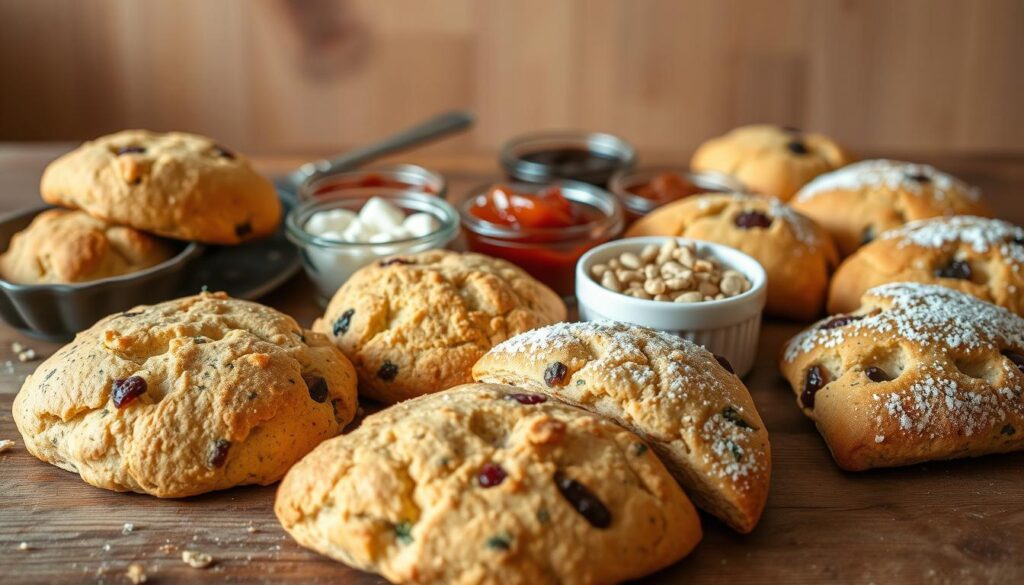
Sourdough scones are incredibly versatile. You can change your recipe to match your favorite flavors, whether you like sweet or savory.
Sweet Flavor Additions
If you love sweet treats, sourdough scones are perfect. Here are some great mix-ins to make your scones even better:
- Fresh berries like blueberries or raspberries
- Dried fruits such as cranberries or apricots
- Chocolate chips or cacao nibs
- Warm spices like cinnamon or cardamom
- Nuts including almonds or pecans
Savory Flavor Combinations
For a savory twist, try these sourdough scones variations:
- Aged cheddar cheese with fresh chives
- Crumbled bacon with rosemary
- Sundried tomatoes with basil
- Caramelized onions with thyme
- Jalapeños with sharp pepper jack cheese
| Flavor Category | Recommended Add-ins | Quantity per Batch |
|---|---|---|
| Sweet Fruits | Blueberries | 1/2 cup |
| Cheese Options | Sharp Cheddar | 1/3 cup |
| Herbs | Fresh Chives | 2 tablespoons |
Pro tip: When adding mix-ins, gently fold them into your dough. Avoid overmixing to keep your scones light and tender.
Storing and Freezing Sourdough Scones
Keeping homemade sourdough scones fresh is key. Whether you’ve baked a batch or prepared them ahead, knowing how to store them is crucial. This helps keep their taste and quality intact.
Best Practices for Freshness
Homemade sourdough scones can last up to 3 days if stored right. Here are some tips to keep them fresh:
- Store scones in an airtight container at room temperature
- Keep them away from direct sunlight and heat sources
- Avoid storing glazed scones in completely sealed containers
How to Freeze Scones for Later Use
Freezing is a great way to keep sourdough scones fresh longer. Pro tip: You can freeze them before or after baking.
- For unbaked scones:
- Shape scones and place on a baking sheet
- Freeze for 1 hour until solid
- Transfer to a freezer-safe bag
- For baked scones:
- Cool completely before freezing
- Wrap individually in plastic wrap
- Place in a freezer-safe container
Freeze scones for up to 2 months to maintain optimal quality and taste.
To enjoy frozen scones, thaw them in the fridge overnight or at room temperature for a few hours. If they’re unbaked, bake for 1-2 minutes longer.
Pairing Sourdough Scones with Beverages
Make your sourdough scones even better by finding the right drink and spread. The best recipe shines when you pair it with drinks and toppings that bring out its flavors.
Tea Pairings for Sourdough Scones
Discover the perfect tea to go with your sourdough scones:
- Earl Grey: Goes great with lavender or lemon scones
- Chamomile: Works well with sweet fruit scones
- English Breakfast: Best with plain or butter scones
- Green Tea: Good with savory herb scones
Coffee Companions
For coffee fans, here are some great pairings:
- Espresso: Perfect with chocolate chip scones
- Cappuccino: Great with nutty or cinnamon scones
- Cold Brew: Wonderful with chocolate or mocha scones
Delectable Spreads and Jams
| Spread Type | Best Scone Pairing |
|---|---|
| Clotted Cream | Classic plain scones |
| Raspberry Jam | Lemon or vanilla scones |
| Honey | Whole wheat or oatmeal scones |
| Lavender Butter | Herb-infused scones |

Pro tip: Try your scones warm and mix up your pairings. You’ll find your favorite sourdough scones flavors.
Troubleshooting Sourdough Scone Issues
Baking sourdough scones can sometimes present challenges, but with the right techniques, you can overcome common problems. Dense or tough scones often result from overworking the dough. This develops too much gluten, reducing the delicate texture you’re aiming for.
When your scones turn out crumbly, it’s usually because of ingredient ratios or moisture content. Professional bakers suggest using cold butter and minimal handling for the perfect texture. For sourdough scones tips, try chilling your dough for 15-45 minutes before baking. This helps prevent excessive crumbling and ensures cleaner cuts.
Temperature is key in achieving perfect scones. Bake at 400℉ and watch carefully during the 18-22 minute baking window. If your scones are consistently dense, check your sourdough discard’s hydration. Also, ensure you’re using cold, unfed starter straight from the refrigerator.
Remember, practice makes perfect. Each batch of sourdough scones teaches you something new about handling the dough. Keep experimenting with your technique, and you’ll soon master the art of creating light, flaky scones that are sure to impress.
FAQ
What makes sourdough scones different from traditional scones?
Sourdough scones stand out because they use sourdough starter. This adds a tangy flavor and improves the texture. The fermentation process makes them taste more complex and can make them lighter and fluffier than regular scones.
Can I use whole wheat flour in my sourdough scones?
Absolutely! Mixing all-purpose and whole wheat flour adds nutrition and a nutty taste. Just remember, whole wheat flour can make scones denser. You might need to adjust the liquid a bit.
How do I know if my sourdough starter is ready to use?
Your starter is ready when it’s bubbly and has doubled in size after feeding. It should smell slightly sour and pass the “float test”. A small spoonful of starter should float in water when it’s at its peak.
Can I make sourdough scones ahead of time?
Yes! You can make the dough ahead and refrigerate it overnight. You can also freeze unbaked scones and bake them straight from frozen, adding a few extra minutes. Baked scones can be stored at room temperature for 2-3 days or frozen for up to a month.
What are some popular flavor variations for sourdough scones?
There are endless options! For sweet scones, try blueberry lemon, chocolate chip, or cinnamon raisin. For savory, go for cheddar and chive, rosemary and parmesan, or sun-dried tomato and herb. Feel free to mix in different ingredients to create your own flavors.
Why did my sourdough scones turn out tough?
Tough scones usually come from overworking the dough. Mix ingredients just until they come together and handle the dough as little as possible. Cold butter and not kneading too much will help keep them tender and flaky.
How important is it to use cold butter?
Cold butter is key for flaky, light scones. It creates small pockets of fat that melt during baking, making layers and a tender texture. Work quickly and keep the butter cold until you’re ready to mix it into the dough.
Can I make gluten-free sourdough scones?
Yes, you can! Use gluten-free all-purpose flour and make sure your starter is gluten-free too. You might need to adjust the liquid and mix gently to get the right texture.
What’s the best way to serve sourdough scones?
Serve them warm with butter, jam, clotted cream, or honey. For savory, try them with herb butter or as a side to soups and salads. They’re great with various teas, coffees, and morning drinks.
How do I store my sourdough starter when I’m not baking?
Store it in the fridge if you’re not baking often. Feed it once a week and let it sit at room temperature for a few hours before refrigerating it again. This slows down fermentation and keeps the starter healthy with minimal effort.

